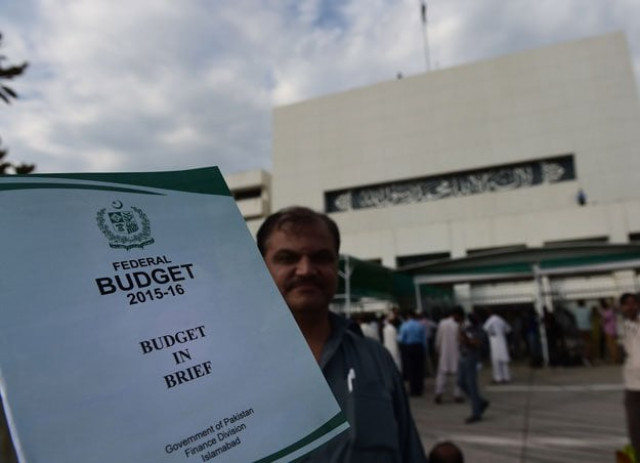Budget 2016: more of the same
This year's budget does not do much in terms of cutting back on the privileges of Pakistan’s wealthy elite

A man poses with a copy of the country's budget report outside the parliament building during the annual budget session in Islamabad on June 5, 2015. PHOTO: AFP

Our biggest complaint against this budget document is that it does not do much in terms of cutting back on the privileges of Pakistan’s wealthy elite. The textile industry, for instance, got their tax protections extended this year on equipment purchases. And for all the talk of taking back the Statutory Regulatory Orders that allow the executive branch of government to whimsically allocate tax breaks to favoured sectors of companies, there were depressingly few specifics on exactly how the government was going to begin taxing the wealthy this year. And judging by the previous day’s press conference, when Finance Minister Dar announced that the government had revised down its long-term tax collection target from 15 per cent of the total size of the economy to 13 per cent, the nation got a preview of the administration’s true economic priorities: they are happy to increase taxes on the middle class and the poor, but the wealthiest of Pakistanis remain untouchables.
This sort of pro-rich slant in taxation is visible throughout the tax proposals presented to parliament. The tax on more expensive cigarettes, for example, will go up by far less than the tax on cheaper cigarettes. Apparently, the government is opposed to smoking, but wants poor people to stop smoking faster. A noble goal, perhaps, but the discrimination still stings. Cigarettes aside, this sort of “leave the rich untaxed” attitude has real consequences. At 64 per cent of GDP, Pakistan’s debt level is not actually very high, but given the low levels of tax revenue, our interest payments will equal nearly 48 per cent of tax revenues during fiscal 2015 and a similar number during fiscal 2016. Having half of all taxes paid in the country go towards interest on the debt — not even actual debt pay down — is nothing short of absurd. And that is before we even get to that other sacred cow that is somehow untouchable, the defence budget, which this year will exceed the entirety of the federal development budget.
Then there is the adhocism that has continued to plague development spending in Pakistan since the 1960s. Some projects get cut while others get added on the basis of the whims of the cabinet rather than careful economic planning. This year, the budget for the National Highway Authority (NHA) and China Pakistan Economic Corridor projects was slashed at the last minute to make room for a Rs45 billion allocation for LNG-based power plants in Punjab. What is even more disturbing than the lack of due process in deciding the development budget is how — by some miraculous coincidence — the development projects slated for Punjab never get cut while those for other provinces are always offered up as the proverbial sacrificial lambs. The cuts in the NHA budget, for instance, come in the year when it had allocated a significant portion of its budget for building more highways in Balochistan. It is almost as though the government feels Punjab is more deserving than the other provinces. We wonder why.
This is no way to run a country, let alone a country that holds the sixth-largest population in the world and one of the youngest. The government of Pakistan will spend $42.3 billion this year. To spend that kind of money without any kind of strategic vision is a travesty, one that will have consequences long after the votes have been counted in the next election.
Published in The Express Tribune, June 6th, 2015.
Like Opinion & Editorial on Facebook, follow @ETOpEd on Twitter to receive all updates on all our daily pieces.


















COMMENTS
Comments are moderated and generally will be posted if they are on-topic and not abusive.
For more information, please see our Comments FAQ